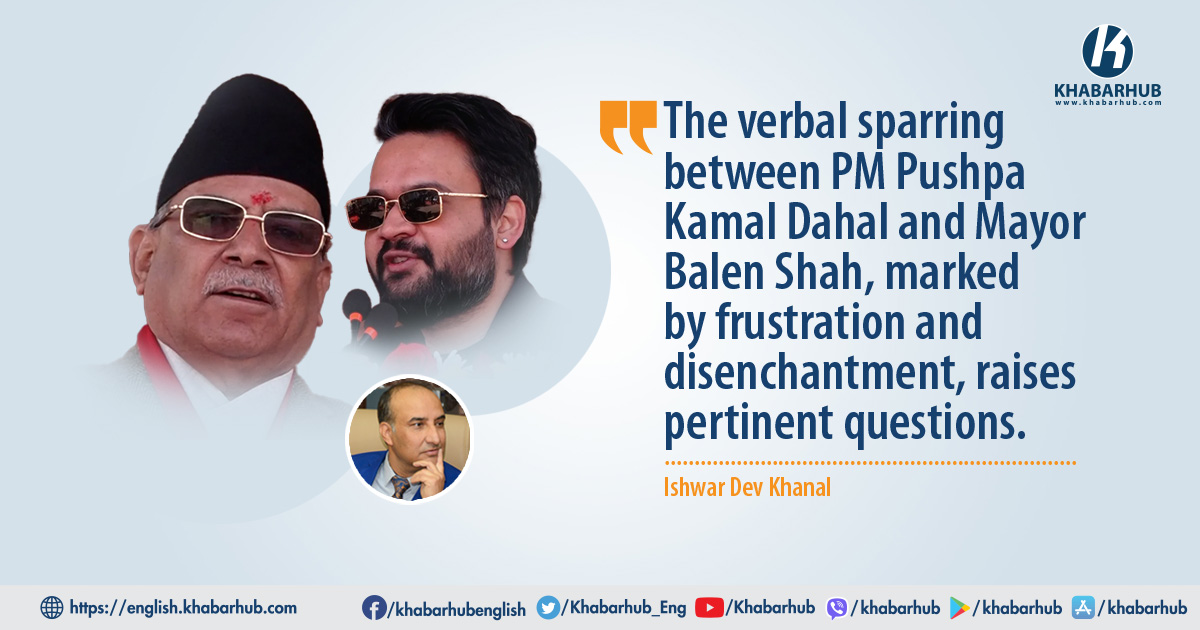KATHMANDU: In the heart of the political battleground, Mayor Balen Shah of Kathmandu has once again hurled thunderous criticisms at the government, laying bare his profound discontent over what he perceives as a lack of cooperation and support for his ambitious endeavors in transforming the Federal Capital.
A clash of wills and ideologies spilled into the open during the Lalitpur metropolis program, revealing the widening gulf between the metropolis and the mighty Singha Darbar on issues like the Bagmati Corridor, garbage, among others.
The two-way interrogation between Prime Minister Dahal and Mayor Shah ignited a raging conundrum: was it appropriate for the executive prime minister to wield such verbal firepower against local demands?
On a fateful Monday, Mayor Shah let loose his ire, directing scathing comments not only at the government but also at Prime Minister Pushpa Kamal Dahal Prachanda himself.
The bone of contention? The alleged lack of collaboration hindering the realization of critical tasks, such as the eviction of squatters from the banks of the revered Bagmati River, the resolution of the long-standing garbage crisis, among others issues.
In a moment dripping with tension, Prime Minister Dahal took center stage as the chief guest, only to find an empty space where Mayor Shah once stood.
The political arena transformed into a war of words as Kathmandu Metropolitan City Mayor Balen and PM Dahal engaged in a verbal duel in a public forum, the atmosphere thick with a palpable sense of “immaturity” emanating from both sides.
One might have expected such disputes to be handled discreetly, perhaps in private discussions or a tête-à-tête at Singha Durbar, involving officials from both entities. However, this diplomatic avenue remained unexplored.
The disenchantment, akin to a turbulent river, overflowed during a public program where Mayor Balen seized the spotlight to air his grievances, highlighting the issues of squatters, garbage, and the contested land in Tinkune.
As a guest on the foundation day of Lalitpur Metropolitan Corporation, Mayor Shah, in his impassioned address, reiterated his plea to Prime Minister Dahal, demanding immediate action to remove encroachments along the Bagmati River banks.
In a bold and assertive move, Mayor Balen announced that the encroachment could be eradicated within the blink of an eye – a mere 5 minutes to 1 hour – if only the Prime Minister exhibited the will to do so.
“We, the local government, can curb some encroachments ourselves, but when it comes to the river’s encroachment,” Mayor Balen exclaimed, “I implored the Prime Minister. If he genuinely desires, resolution could be achieved in the time it takes to traverse from this very spot to the next program.”
Expanding on the urgency of the matter, Balen emphatically added, “There are issues that can be swiftly resolved, within 5 minutes to 1 hour, if the PM or the Ministry of Home Affairs wishes. Matters that we mayors, armed solely with our law enforcement, cannot tackle alone.”
Balen also unleashed a torrent of grievances against both the Federal and State governments, accusing them of strangling the city’s development initiatives.
With passion in his voice, Balen lamented the legal quagmire he faced while trying to push forward various projects.
His frustration echoed through the venue as he emphasized the urgent need to support, not hinder, local governments in their essential tasks for the community.
Balen’s accusations against the federal government’s lack of initiative in waste management laws roared through the room.
He directly called out Prime Minister Dahal to address the legal hurdles obstructing the crucial waste management project in Bancharedanda, Nuwakot.
In a crescendo of political tension, the question echoed through the air like a thunderclap: How fitting was it for the executive prime minister to unleash a forceful response on the public stage to the clamors of local representatives challenging the federal government?
In a plea for unity, Balen urged the government to take swift action to ensure the rivers of Kathmandu flowed freely.
In a moment dripping with tension, Prime Minister Dahal took center stage as the chief guest, only to find an empty space where Mayor Shah once stood.
As the drama unfolded, Prime Minister Dahal’s response was charged with anger.
Expressing his “irritation” at Mayor Shah’s premature departure, he demanded respect for the chief guest.
Dahal defended his positive stance on problem-solving but accused Mayor Balen of not reciprocating with similar efforts.
The Prime Minister’s words cut through the air, challenging Balen’s actions and responsibilities.
“You have more responsibility to coordinate Lalitpur, Bhaktapur, and other municipalities within Kathmandu. What stopped you from recognizing what I constantly said I would help you with?” Prime Minister Dahal’s frustration spilled over.
In a scathing critique, Dahal questioned the mayor’s effectiveness, challenging him on the Bagmati Corridor and Tinkune land problems.
Despite meetings and promises, the issues remained unresolved, leaving a palpable tension between the metropolis and the federal government.
The clash intensified as Mayor Shah’s efforts to evict squatters from the Bagmati Corridor faced federal resistance.
The dispute escalated, with the federal government insisting on Land Commission involvement, while the mayor sought a more immediate resolution.
In this riveting exchange of accusations and frustrations, the stage was set for a battle of wills between local and federal powers, leaving the fate of Kathmandu’s development hanging in the balance.
In a crescendo of political tension, the question echoed through the air like a thunderclap: How fitting was it for the executive prime minister to unleash a forceful response on the public stage to the clamors of local representatives challenging the federal government?
Discussions on cooperation between federal and local governments seemed futile, as Shah’s pleas for support echoed in the political abyss.
The tale of the land dispute in Tinkune unfolded over several years, a protracted saga of governmental acquisition at Tinkune near Koteshwar.
Yet, the Metropolitan Corporation remained shackled by a lawsuit, the chains of local resistance demanding compensation.
Mayor Shah, a lone voice in the storm, pleaded for the Council of Ministers to decide on compensation, allowing the metropolis to forge a park from the dormant land.
His cries fell on deaf ears, drowned in the procedural quagmire conjured by the federal government.
Meanwhile, in a flashback to July 7, Mayor Balen had sparked controversy with allegations against Prime Minister Dahal’s ties to an Indian citizen.
Facebook became the battleground as Mayor Shah questioned the integrity of parliamentarians and hinted at shadowy allegiances within the government.
A meeting on January 30 between PM Dahal and Mayor Shah only deepened the intrigue.
Finally, the stage is set, and Kathmandu awaits the resolution of this clash of titans, where the fate of the city hangs in the balance.
Discussions on cooperation between federal and local governments seemed futile, as Shah’s pleas for support echoed in the political abyss.
On September 5, 2023, the discord found another voice in Nepali Congress leader Dr. Shekhar Koirala, who condemned the chaotic statements from both Prime Minister Dahal and Mayor Shah.
He warned against irresponsible remarks fueling tensions, declaring that the nation could not thrive amid such turmoil.
For instance, Mayor Balen Shah, undeterred, defended his drastic move to halt waste collection from Singha Durbar.
In a defiant Facebook post, he accused the central government of neglect, irresponsibility, and carelessness.
The decision, he claimed, was a desperate cry for attention, a call for Singha Durbar to acknowledge the struggles of the people.
As the political storm raged on, Mayor Shah enumerated 14 initiatives to coordinate with different ministries, laying bare the attempts to bridge the divide.
In a final act of defiance, garbage collection ceased at Singha Durbar, a symbolic gesture challenging the very heart of the nation’s administration.
Finally, the stage is set, and Kathmandu awaits the resolution of this clash of titans, where the fate of the city hangs in the balance.









Comment